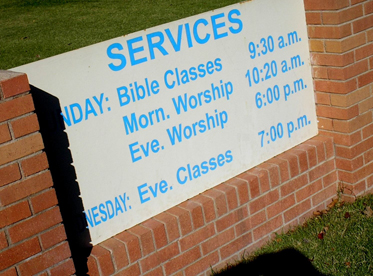Click here to listen to this article:
 Disciples of Christ abide in Christ’s word (John 8:31). That means they diligently seek Bible authority for everything they do. Paul taught, “whatever you do in word or deed, do all in the name of the Lord” (Col. 3:17, NKJV). To act “in the name” of someone means to act under his authorization. It is to act on his behalf, or at the very least, to act in accordance with his instructions. Instructions can be explicit or implicit. I might say, “go get me some food.” In this instruction, I have not specified the type or quantity of food. I have not said anything about where to buy the food, or how much to spend. You could carry out my instruction—you could “abide” in my word, or act “in my name” by bringing me the food of your choice, in the quantity, value, and type of your choosing. On the other hand, if I said, “go get me a small pepperoni pizza from Pizza Hut,” I have given you some specific terms by which you must carry out my instructions. If you brought me a cheeseburger from McDonalds, you could not be said to have acted “in my name” or to “abide” in my word. In truth, you would have disregarded or even disobeyed my instructions (if I held any authority over you).
Disciples of Christ abide in Christ’s word (John 8:31). That means they diligently seek Bible authority for everything they do. Paul taught, “whatever you do in word or deed, do all in the name of the Lord” (Col. 3:17, NKJV). To act “in the name” of someone means to act under his authorization. It is to act on his behalf, or at the very least, to act in accordance with his instructions. Instructions can be explicit or implicit. I might say, “go get me some food.” In this instruction, I have not specified the type or quantity of food. I have not said anything about where to buy the food, or how much to spend. You could carry out my instruction—you could “abide” in my word, or act “in my name” by bringing me the food of your choice, in the quantity, value, and type of your choosing. On the other hand, if I said, “go get me a small pepperoni pizza from Pizza Hut,” I have given you some specific terms by which you must carry out my instructions. If you brought me a cheeseburger from McDonalds, you could not be said to have acted “in my name” or to “abide” in my word. In truth, you would have disregarded or even disobeyed my instructions (if I held any authority over you).

As Christians work to lovingly and respectfully “abide” in the word of Christ, there are times when the Lord has given instructions that vary in the level of specificity with which they are given. For example, Jesus has commanded to “make disciples of all the nations, baptizing them in the name of the Father and of the Son and of the Holy Spirit” (Matt. 28:19). In this command there are some things that are explicit and some that are not. Both Scripture and ancient usage confirm that the verb baptizo, translated “baptizing” in this verse, meant, “to immerse.” That means in order to carry out this instruction, one must be immersed. Nothing is said, however, about the nature or condition of the water into which one must be immersed. Must it be a running stream? Jesus’ baptism took place at the Jordan River (Matt. 3:13-16)—must all baptisms be in rivers? No. On the day of Pentecost three thousand souls were baptized in Jerusalem (Acts 2:41). Jerusalem was filled with pools, springs, and washing tanks called “mikvehs,” but no rivers like the Jordan. When the Ethiopian eunuch was baptized, they were on a road going from Jerusalem to Gaza, specifically identified as “desert” (Acts 8:26). Even so, they came to water of sufficient quantity that “both Philip and the eunuch went down into the water, and he baptized him” (Acts 8:36, 38). This indicates that one can fulfill the instruction to baptize by any of these types of water so long as the person is immersed. In this case we could say that the action is specifically authorized—it is immersion, but the nature of the medium into which the action is carried out is generically authorized—it could be a river, a baptistery, or any vessel with water sufficient enough to immerse a person.
To “abide” in the word of Christ it is absolutely true that Christians must have authority for all that they say and do, but does that mean that we must establish specific authority for everything we say and do? In the example above, we can find no Scripture that specifically authorizes the use of (what we call) a “baptistery.” Does that mean to use a baptistery is to act without authority? No. Any command carries with it what is necessary to fulfill that command. When something is specified it is restrictive. When nothing is specified, the command is said to be generic. The command to “make disciples of all the nations, baptizing them” must be understood as generic, in light of the fact that the approved examples that record its fulfillment do not restrict the type of water into which one is to be baptized. A “baptistery,” therefore, can be understood as simply a means to expedite (or carry out) the generic command to baptize.
Let’s consider these principles in relation to an element of worship. The Lord’s Supper is one of five acts of worship authorized within the New Testament. Jesus commanded its observance on the night He was betrayed prior to His crucifixion (Matt. 26:26-30; Mark 14:22-26; Luke 22:14-23; 1 Cor. 11:23-26). The four accounts of Jesus’ institution of this memorial specify a number of things, and we can determine a few additional things from implicit evidence. For example, all four accounts specify an order and the elements involved. First, bread was blessed and eaten (Matt. 26:26; Mark 14:22; Luke 22:19; 1 Cor. 11:23-24). Second, the “cup” was blessed and drunk (Matt. 26:27-28; Mark 14:23; 1 Cor. 11:25-26). Luke records the detail that it was blessed at the beginning of the meal and divided among them (as was customary at the Passover meal), but does not record the blessing before its consumption after the meal when it was drunk as a memorial (Luke 22:17-18).
 What do know about these elements? We can know that the “bread” was not ordinary bread, because it was eaten in connection with the “Passover” (Luke 22:14). The Law of Moses commanded all leaven to be removed from the house when the Passover was observed and only unleavened bread was to be eaten (Exod. 12:15, 19; 13:7). By the term “cup,” the Lord was not referring to the container but to its contents. He calls it “fruit of the vine” (Matt. 26:29; Mark 14:25; Luke 22:18), and Christians “drink this cup” (1 Cor. 11:26). This wasn’t apple juice, coffee, or milk. It was the product of the vine—grape juice. To obey the command to observe this memorial we cannot eat steak, or cinnamon rolls—we cannot drink Coke, or Mountain Dew. We eat unleavened bread, and drink grape juice. These things are implicitly authorized and establish specific authority restricting all other things.
What do know about these elements? We can know that the “bread” was not ordinary bread, because it was eaten in connection with the “Passover” (Luke 22:14). The Law of Moses commanded all leaven to be removed from the house when the Passover was observed and only unleavened bread was to be eaten (Exod. 12:15, 19; 13:7). By the term “cup,” the Lord was not referring to the container but to its contents. He calls it “fruit of the vine” (Matt. 26:29; Mark 14:25; Luke 22:18), and Christians “drink this cup” (1 Cor. 11:26). This wasn’t apple juice, coffee, or milk. It was the product of the vine—grape juice. To obey the command to observe this memorial we cannot eat steak, or cinnamon rolls—we cannot drink Coke, or Mountain Dew. We eat unleavened bread, and drink grape juice. These things are implicitly authorized and establish specific authority restricting all other things.
Does the New Testament teach anything else about its observance? Yes. We should note first, that in the accounts in the gospels nothing is said about when the memorial was to be observed. Even in Paul’s recounting of its institution his only time reference is “as often as you eat this bread and drink this cup, you proclaim the Lord’s death till He comes” (1 Cor. 11:26). Paul does, however, teach a number of things that further clarify the nature of its observance. We saw above that it was first observed during the Passover meal. Is the Passover meal also to be observed by Christians? No. The context of Paul’s recounting of the institution comes in the midst of a rebuke to the Corinthians for making the memorial a common meal. To remedy this he commands, “if anyone is hungry let him eat at home” (1 Cor. 11:34). This is not a full meal. It is a memorial of two elements representing Christ’s body and blood. It is Paul who reveals to us two names for this memorial. It is the “Lord’s Supper” (1 Cor. 11:20) or the “communion” of Christ’s body and blood (1 Cor. 10:16). Paul also teaches us the context of its observance. This is not (generally speaking) a family observance—it is to be offered, “when you come together to eat” (1 Cor. 11:33). Specifically, it is “when you come together in one place” (1 Cor. 11:20), or “when you come together as a church” (1 Cor. 11:18). When did the Corinthians come together “as a church”? At the end of this same epistle Paul commanded another of the five acts of worship under Christ—giving is to be done “on the first day of every week” (1 Cor. 16:1). This infers that the church in Corinth came together on Sunday, the first day of the week—the day John later calls “the Lord’s Day” (Rev. 1:10). If we do as they did we act within the authority of Scripture.
Now, we know that Christians assembled at other times also. For example, when the church was first established the Holy Spirit records that in Jerusalem they assembled “daily with one accord in the temple,” adding that they were also “breaking bread from house to house” (Acts 2:46a). Earlier in the same text the Lord’s Supper is described as “the breaking of bread” (Acts 2:42). Does that mean that the church in Jerusalem observed the Lord’s Supper daily? No. Remember, that Paul rebuked the Corinthians for making the Lord’s Supper a common meal, telling them to eat at home for hunger (1 Cor. 11:34). The Christians at Jerusalem assembled as a church in the temple. The phrase “breaking bread from house to house” refers to meals at home for hunger. The last part of the verse says, “they ate their food with gladness and simplicity of heart” (Acts 2:46b). This “breaking bread” was not the Lord’s Supper, it was common meals they shared within their homes. Later in the book of Acts, when Paul was at Troas, we are told that “on the first day of the week” Paul spoke to the church “when the disciples came together to break bread” (Acts 20:7). Just like Corinth we see the church coming together on Sunday, but here it is specifically recorded that they did so “to break bread” (i.e. to observe the Lord’s Supper). From this evidence we find authority for the church to assemble on the first day of the week to observe the Lord’s Supper and offer the collection, but also to assemble at other times for prayer, singing, and Bible study.
 We have seen that Scripture specifies the order, the elements, the context, and the day on which the memorial was to be observed. Let’s ask some questions about what is not specified. Must the bread be made by hand or can it be store-bought? Scripture does not specify. Any type of unleavened bread is generically authorized. Must the grape juice be made from black grapes or could concord grapes be used? Scripture does not specify. Any type of grape juice is generically authorized. If a brother or sister argued, “We have no authority to buy unleavened bread from a store,” it would be seeking specific authority for something that is generically authorized. If one should argue, “We have no authority to use juice from concord grapes,” again, it is seeking specific authority for something that is generically authorized.
We have seen that Scripture specifies the order, the elements, the context, and the day on which the memorial was to be observed. Let’s ask some questions about what is not specified. Must the bread be made by hand or can it be store-bought? Scripture does not specify. Any type of unleavened bread is generically authorized. Must the grape juice be made from black grapes or could concord grapes be used? Scripture does not specify. Any type of grape juice is generically authorized. If a brother or sister argued, “We have no authority to buy unleavened bread from a store,” it would be seeking specific authority for something that is generically authorized. If one should argue, “We have no authority to use juice from concord grapes,” again, it is seeking specific authority for something that is generically authorized.
What does Scripture teach about the time of the observance? We know it was on the first day of the week, and in the context of the assembly of the church—it was not every day, nor was it taken to the home of members who were away from the assembly. Was it in the morning or afternoon? Was it at the beginning of a service or at the end? Scripture does not specify these things. If a brother or sister argued, “We have no authority to observe the Lord’s Supper at 11:00 o’clock,” once again, it would be seeking specific authority for something generically authorized. We have seen that the New Testament church assembled “as a church” at times other than the first day of the week. Could they meet multiple times on the same day? Scripture does not specify, but the command to assemble generically authorizes assemblies at any time (Heb. 10:24-25). An eldership could certainly make decisions about assembly times in consideration of the needs of the members within the congregation.
 So what if a congregation chooses to have morning and evening assemblies of the church on the first day of the week? Shift workers may often find this the only way they are able to worship on the Lord’s Day. The question is sometimes is raised, “Do we have authority to offer the Lord’s Supper at both assemblies?” Some would argue, “This is a second observation of the Lord’s Supper!” Is that really the case? The context is still the assembly of the church. The day is still the first day of the week. For a brother or sister who could not be at a morning assembly it is not a second observance—it is his or her first (and only) observance. Their brethren who serve them the elements and pray with them do not eat and drink a second time—they simply offer their brothers and sisters an opportunity to worship for the first time. If one argued, “We have no authority to offer the Lord’s Supper at a second assembly,” in the same way we observed above, it would be seeking specific authority for something that is generically authorized. Does a time delay change anything about whether it is “the first day of the week”? No. In large congregations we would think nothing about the time delay from when the first member eats the bread until, the last eats. Does this constitute different observances? What if someone comes in late? Could they not receive both elements? Few would question this. It is no different if the time delay is a few hours, rather than a few minutes—it is still the first day of the week. The biblical evidence authorizing us to offer the Lord’s Supper on the first day of the week generically authorizes its observance in any of these ways. Perhaps, the question should not be, “Does the Bible authorize the Lord’s Supper on Sunday night,” but rather, do brethren have the right to deny their brothers and sisters the opportunity to obey the Lord’s charge to observe the memorial while it is still the first day of the week in the assembly of the church? No, we do not!
So what if a congregation chooses to have morning and evening assemblies of the church on the first day of the week? Shift workers may often find this the only way they are able to worship on the Lord’s Day. The question is sometimes is raised, “Do we have authority to offer the Lord’s Supper at both assemblies?” Some would argue, “This is a second observation of the Lord’s Supper!” Is that really the case? The context is still the assembly of the church. The day is still the first day of the week. For a brother or sister who could not be at a morning assembly it is not a second observance—it is his or her first (and only) observance. Their brethren who serve them the elements and pray with them do not eat and drink a second time—they simply offer their brothers and sisters an opportunity to worship for the first time. If one argued, “We have no authority to offer the Lord’s Supper at a second assembly,” in the same way we observed above, it would be seeking specific authority for something that is generically authorized. Does a time delay change anything about whether it is “the first day of the week”? No. In large congregations we would think nothing about the time delay from when the first member eats the bread until, the last eats. Does this constitute different observances? What if someone comes in late? Could they not receive both elements? Few would question this. It is no different if the time delay is a few hours, rather than a few minutes—it is still the first day of the week. The biblical evidence authorizing us to offer the Lord’s Supper on the first day of the week generically authorizes its observance in any of these ways. Perhaps, the question should not be, “Does the Bible authorize the Lord’s Supper on Sunday night,” but rather, do brethren have the right to deny their brothers and sisters the opportunity to obey the Lord’s charge to observe the memorial while it is still the first day of the week in the assembly of the church? No, we do not!
Kyle Pope
Amarillo, TX
kmpope@att.net
For Further Study:
Sermon: Generic and Specific Authority Audio | PPT | Outline
Tract: The Lord’s Supper PDF | HTML

